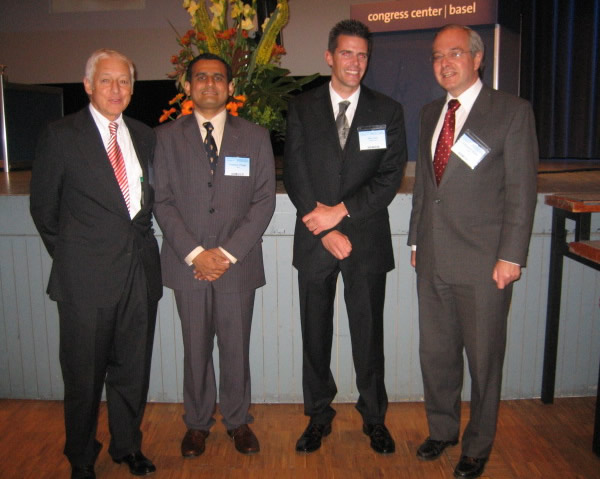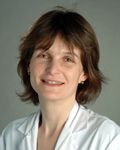swissTB award 2006
Dr. Claudia Tueller und Dr. Reto Guler

Dr. Prashant Chhajed und Dr. Reto Guler nehmen den SwissTB award 2006 an der offiziellen Feier im Kongresszentrum Basel von SwissTB Präsident Dr. Otto Brändli und SwissTB Vizepräsident Prof. Laurent Nicod entgegen.
Im Betrag von von je sFr. 5'000.- an die Erstautoren der beiden folgenden Arbeiten verliehen: C. Tueller, P. N. Chhajed, C. Buitrago-Tellez, R. Frei, M. Frey, M. Tamm, Pneumologie Universitätsspital Basel und Barmelwaid Aarau: Value of smear and PCR in bronchoalveolar lavage fluid in culture positive pulmonary tuberculosis. Eur Respir J 2005; 26:767-72.
und
Reto Guler, Maria L. Olleros, Dominique Vesin, Roumen Parapanov, Irene Garcia, Department of Pathology and Immunology, Universität Genf:: Differential Effects of Total and Partial Neutralization of Tumor Necrosis Factor on Cell-Mediated Immunity to Mycobacterium bovis BCG Infection. Infection and Immunity 2005; 3668-76.
Die Preisträger haben Möglichkeiten aufgezeigt, wie die Tuberkulose rascher und sicherer diagnostiziert werden kann und wie sich der Körper gegen eine Infektion mit Mykobacterien wehren kann. Mit der Anwendung von neuen Immun-Modulatoren (Tumor Necrosis Faktor Alpha-Blockern), z. B. in der Behandlung von Rheumatoider Arthritis werden neue Angriffspunkte für Tuberkulose-Medikamente erkennbar. Gleichzeitig muss aber die Gefahr eines Ausbruchs einer latent vorhandenen Tuberkulose-Infektion wieder vermehrt von den klinisch tätigen Ärzten beachtet werden.
Dass auch junge Schweizerinnen und Schweizer an der Tuberkuloseforschung beteiligt sind, ist wegen der leider immer noch zunehmenden globalen Ausbreitung dieser Infektionskrankheit sehr wichtig .
Das Swiss TB Award wird jährlich für die beste Forschungsarbeit auf dem Gebiet der Tuberkulose durch die Schweizerische Stiftung für Tuberkuloseforschung verliehen.

SwissTB Preisträgerin 2006 für die beste klinische Arbeit: Dr. Claudia Tueller
At present, further investigations are needed in patients with suspected pulmonary tuberculosis (TB) and either negative sputum smear or without sputum. The aim of the present study was to analyse the yield of bronchoalveolar lavage fluid (BALF) smear and PCR in patients with confirmed pulmonary TB. Patients with a positive culture for Mycobacterium tuberculosis complex in sputum or BALF were analysed over 5 yrs. In total, 90 out of 230 (39%) patients with culture-positive pulmonary TB had a positive sputum smear, and 120 patients underwent bronchoscopy. BALF smear was positive in 56 (47%), BALF PCR in 93 (78%) patients, and BALF smear and/or PCR was positive in 83%. In total, 71 patients who underwent bronchoscopy and had complete clinical records were further analysed. BALF (smear or Mycobacterium tuberculosis complex-PCR) allowed a rapid diagnosis in 10 (59%) out of 17 patients who had a negative sputum smear, and 49 (91%) out of 54 patients without sputum production. Of these 71 patients, 12 (17%) were only culture positive. Rapid diagnosis of pulmonary TB by smear and/or PCR was made in 190 out of 210 patients (90%) in sputum or BALF. In conclusion, combined use of bronchoalveolar lavage fluid smear and Mycobacterium tuberculosis complex-PCR has a good diagnostic yield in patients with sputum smear-negative tuberculosis or without sputum production.
Publikation
Value of smear and PCR in bronchoalveolar lavage fluid in culture positive pulmonary tuberculosis
C. Tueller1, P.N. Chhajed1, C. Buitrago-Tellez2, R. Frei3, M. Frey4 and M. Tamm1
Depts. of 1Pulmonary Medicine, 2Radiology and 3Bacteriology, University Hospital Basel, Basel and 4Respiratory Medicine, Hospital Barmelweid, Barmelweid, Switzerland
 SwissTB Preisträger 2006 für die beste Forschungsarbeit: Dr. Reto Guler
SwissTB Preisträger 2006 für die beste Forschungsarbeit: Dr. Reto Guler
Excess Tumor Necrosis Factor (TNF) production is one of the main causes of pathogenesis of severe inflammatory diseases such as rheumatoid arthritis. Today, rheumatoid arthritis patients are treated with soluble TNF receptor fusion protein which neutralize excess TNF. However, anti-TNF therapies to treat inflammatory diseases have introduced a new threat since TNF inactivation is associated with the recurrence of tuberculosis and also of many opportunistic infections. Consequently, experimental animal models should provide important understanding of the biological role of the interaction between TNF and its neutralizing soluble TNF receptor fusion protein in serious infections. Therefore, we investigated the interaction between TNF and soluble TNF receptor fusion protein (sTNFR1) in host defense against an avirulent mycobacteria, Mycobacterium bovis BCG. The generation of transgenic mice expressing high levels of human sTNFR1 have allowed to demonstrate that total inhibition of TNF is associated with impaired granuloma formation, reduced macrophage activation, dysregulated cytokine production, deficiency in bactericidal mechanisms, leading to bacterial overgrowth and animal death. However, partial inhibition of TNF by low levels of soluble TNFR resulted in a more rapid activation of innate protective immune response to BCG infection associated with increased macrophage activation, enhanced regulated TNF release, more rapid granuloma differentiation, and increased bactericidal mechanisms. In conclusion, whereas total neutralization of TNF led to increased susceptibility to mycobacterial infection, partial TNF inhibition resulted in enhanced granuloma formation and increased macrophage activation. Therefore, modulation of TNF-associated functions would be more suitable than total TNF inhibition for efficient anti-TNF therapies.
Publication: Guler, R., M. L. Olleros, D. Vesin, R. Parapanov, and I. Garcia. 2005. Differential effects of total and partial neutralization of tumor necrosis factor on cell-mediated immunity to Mycobacterium bovis BCG infection.
Publikation
Differential Effects of Total and Partial Neutralization of Tumor Necrosis Factor on Cell-Mediated Immunity to Mycobacterium bovis BCG infection
Dr. Reto Guler1,2
1Department of Pathology and Immunology, Centre Medical Universitaire, 1 rue Michel-Servet, 1211 Geneva 4, Switzerland, 2Institute of Infectious Disease and Molecular Medicine, Health Science Faculty, University of Cape Town, South Africa
